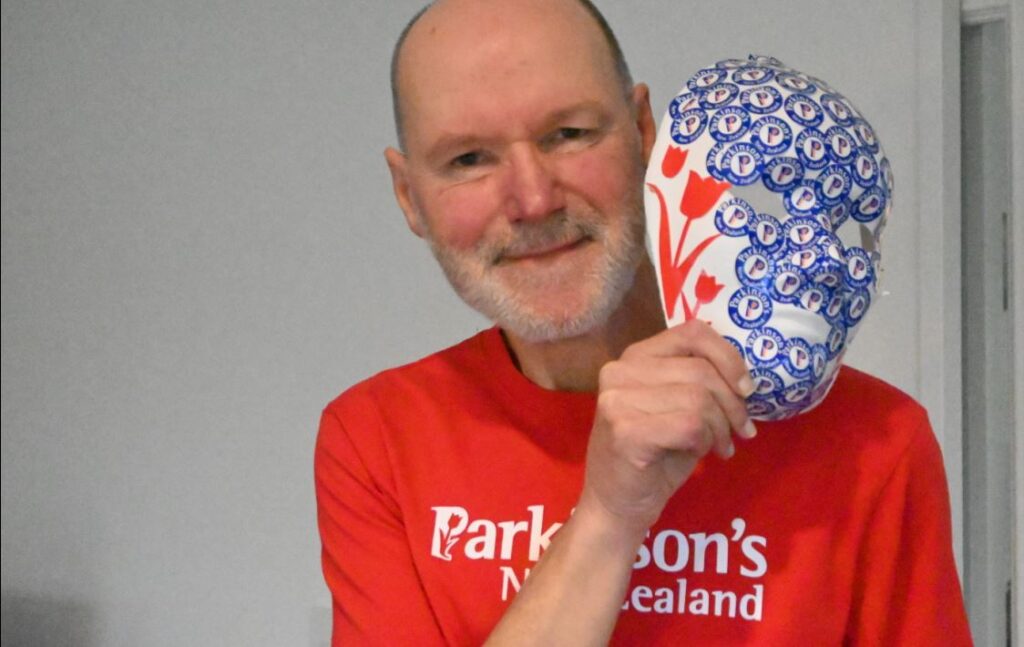
A diagnosis of Parkinson’s Disease turned Tim Roberts’ life on its head but seven years later the Raumati man has found meaning and fulfilment in a new life as a poet, an author and visual artist.
“I was diagnosed with Parkinson’s at the age of 50. It devastated my family and I – and even my dog,” he says.
“Now, in spite of this disease – or because of it – I am learning to build a life of poetry, creativity, vitality and, I hope, of kindness and service to others.
“It’s all new for me and I love it.”
Born in Hong Kong but raised in the United Kingdom, Tim Roberts has been a police detective, and a university lecturer.
He and his wife Deborah came to New Zealand in 2007 looking for a better quality of life for themselves and their three daughters,
After a road trip through the country, they found what they were looking for in Raumati on the Kāpiti Coast.
He used the skills he had developed to become an executive coach and leadership facilitator.
His interest in poetry began at school at the age of 11. It was rekindled when he bought a book of poems by the legendary Japanese haiku writer Matsuo Basho at Crewe Railway Station in England in 1986.
Scottish comedian Billy Connolly played a role in Raumati’s Tim Roberts being diagnosed Parkinson’s
He went to a Billy Connolly concert in Wellington, not long after the comedian had been diagnosed with Parkinson’s.
“Billy talked about someone riding with him in the lift of an hotel who commented on what he was doing with his arm and suggested he see a doctor.
“He was demonstrating with his arms and I suddenly thought – ‘that’s what I do’.”
Tim says he went through some very dark and difficult times before he was diagnosed with Parkinson’s several months later.
“There were times when I could hardly move,” he says.
Diagnosis was followed by the regime of regular medication which compensates for the loss of the natural agent in people with Parkinson’s that sends messages to the brain to coordinate movement.
“Because of the fluctuating nature of the medication’s efficacy, it presents challenges of its own,” says Tim.
Poetry – and the haiku in particular – returned as a powerful tool to help him adapt to the new life that Parkinson’s had imposed.
Tim has completed a book of haiku poems entitled Busted – based on his experiences as a police officer in Cheshire. It’s being published by Red Moon Press a leading English language haiku publisher based in the United States.
He says the creative energy he puts into writing and painting driftwood he collects from Raumati Beach is a huge help in managing his Parkinson’s.
“While I am working, I’m not aware of the symptoms and the effect can last for several hours.
“I used to feel isolated but now I don’t because of the connections I have developed.”
He is currently completing a book of haiku about Parkinson’s which will be a mixture of previous and new work. He hopes to have it published within the near future.
One of the haiku will include an early one:
Dreaming of birdsong
I awake to a wolf shaking me
Tremors again.
Parkinson’s NZ’s annual street day collection will be held in Kāpiti-Horowhenua on Friday 4 November. Coastlands in Paraparaumu has generously provided space for an exhibition of mask art produced by people who are part of the Parkinson’s community. While masks are part of New Zealand’s Covid shared experience, facial masking – rigidity in facial muscles – is a symptom of Parkinson’s.




































